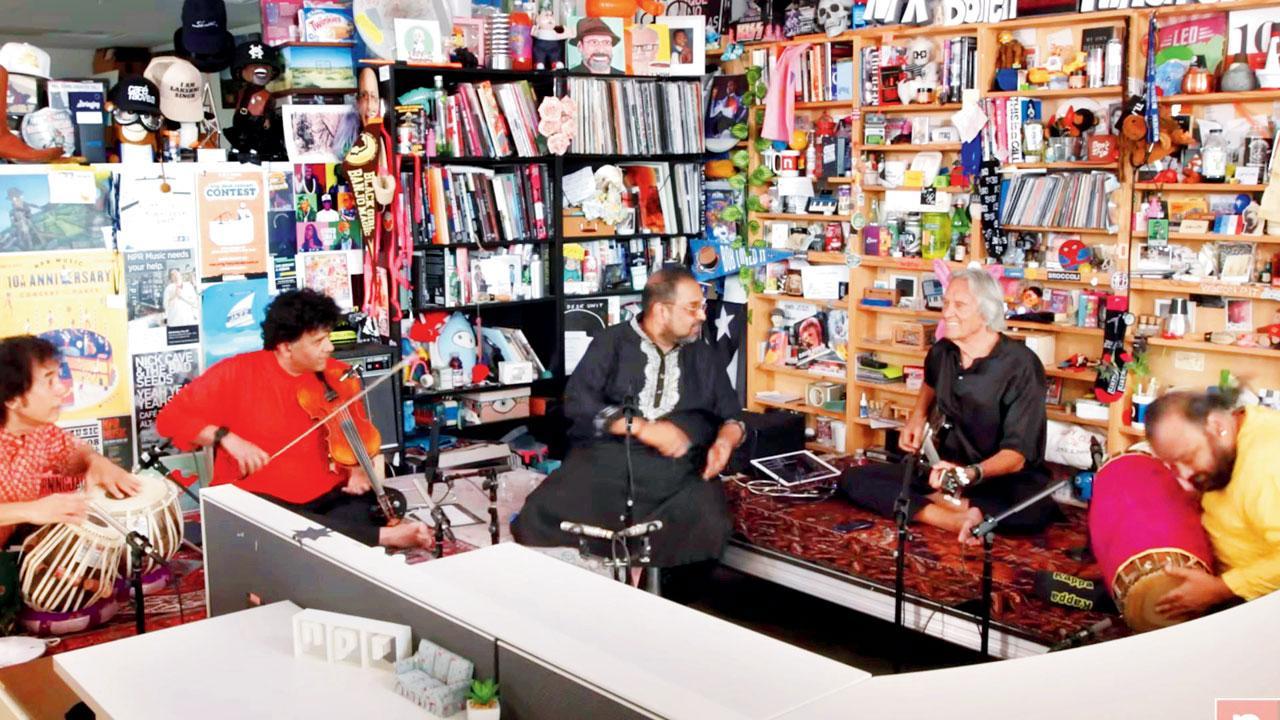America gave the longest overdue Grammy to Shakti; Indians must equally acknowledge debt to McLaughlin

Shakti members Zakir Hussain, Ganesh Rajagopalan, Shankar Mahadevan, John McLaughlin and V Selvaganesh
 Do you have a concert moment that you might take to the pyre? Okay, let me go first. Decidedly, for me, it’s the moments with Shakti, at New York City’s Central Park, circa 2000. It’s an open-air concert, of course.
Do you have a concert moment that you might take to the pyre? Okay, let me go first. Decidedly, for me, it’s the moments with Shakti, at New York City’s Central Park, circa 2000. It’s an open-air concert, of course.
ADVERTISEMENT
Horn of a car on the street outside the park goes off. The band Shakti is in a state of trance. As is the audience. The continuously droning honk interferes with the music. Almost in sync, the band starts jamming to the honking sound, as if this was planned.
Little later, a butterfly wanders on to the stage. Zakir Hussain, on the tabla, starts to tease the fluttering butterfly with his drum. You watch the butterfly dance to his beats, swiftly hovering up, down, sideways, to the tabla’s tempo. The crowd roars alongside!
Who else was there on stage? Vikku Vinayakram, god of ghatam (clay pot), for sure; U Srinivas, whose first name was his instrument, mandolin; V Selvaganesh, on the kanjira; and above all, the Brit-born American, John Mclaughlin, the leader of the band he put together with violinist, L Shankar, in the early 1970s. Shankar subsequently quit.
Shakti picked up the longest overdue Grammy in 2024 for This Moment, their first album in 46 years. McLaughlin couldn’t make it for the event. The group, as it stands now, suitably thanked “John Ji”, which is fine, desi endearment for a respectful suffix.
Although if you wish to own him entirely as an Indian, the better replacement for John Ji is Mahavishnu, which is the spiritual name he adopted once, under the spell of his guru, Sri Chinmoy (1931-2007). He founded the Mahavishnu Orchestra, which, contrary to its name, was predominantly a rock band. John Ji, protégé of Miles Davis, is a man of jazz.
It’s impossible to fathom how hard he must’ve worked to penetrate the tough/closed Indian music scene, introducing both the Carnatic and Hindustani classical to each other, fusing the two silos into a guitar he invented, with two sets of strings, for the purpose of Shakti.
The beauty of Shakti, unlike a lot of western-Indian fusion, is that the terms of engagement are totally desi/subcontinental—making Indian classical music accessible to regular Joes like me. Not to suggest that’s essential for best results.
The direction of influence was in the reverse when, say, Pakistani Nusrat Fateh Ali Khan collaborated with the Canadian Michael Brook.
Their Night Song (1996), to my mind, is the world’s greatest album ever, period; let alone fusion. That’s how many of us first got to know Nusrat, mixing qawwali to ambient music belting in a recording studio.
It would’ve been difficult for Nusrat to perform Night Song on stage. Whereas Shakti is all about experiencing live. I’ve heard This Moment on loop over the weekend; it does nothing to me. There isn’t a composition that stays. It’s obviously not in the mukhra-antara-melody space.
Far too visceral for that. You can instantly tell, Shankar Mahadevan (vocals), Ganesh Rajagopalan (violin), along with Selvaganesh (kanjira), and the OG John Ji and Zakir, playing off each other’s energies, could border on ecstasy on stage, regardless.
Pretty much everyone associated with Shakti have been rightly honoured by the Indian government with the top, civilian Padma Awards. Noticeably, not John Ji. Oh, why? Never in the history of the American Grammys have so many Indians dominated the awards as 2024—Zakir picked up three!
And I don’t know any non-Indian who’s done as much for its music, beyond flirting with the orient as an occult, that was such a fad in the 1960s.
Surely, John Ji must’ve been criticised by Jazz purists in his early years for creating an eclectic mess—in the same way that Zakir was for long considered by Hindustani classical music’s gatekeepers as a sell-out to the West.
As John Ji puts it in the documentary, The Story of Shakti (1977, on YouTube): “I just had a dream once, of a piece of architecture with four shiny pillars making a perfect edifice, and I could see me, [child prodigy] Zakir, Shankar [reading music at Wesleyan University], and Vikku [that John Ji brought down to the US].”
I don’t know if these four men talked to each other in that dream. Nothing still beats these musicians playfully conversing with their instruments over a jugalbandi—mimicking human voices; art at its peak—which is so integral to free jazz as well.
Shakti have been off and on as a quartet over five decades. They disbanded again after ‘Mandolin’ Srinivas passed away, in 2014, from a liver ailment, in his 40s. The first time I reported a music event was also Shakti, circa 2004, at Rang Bhavan, Mumbai’s Mecca for music.
As usual, each member in the group got their own few minutes of showing off their instrumental chops for the finale. Zakir entered last, going for broke.
At some point, it seemed his hands had left his body, externally motorised to tame the tabla into absolute submission. We were gasping for breath, throughout—no idea what had hit us.
The piece read, “If the VT station nearby was a vibration, it would be this!” Rang Bhavan is no more. Shakti is around, because Zakir and John Ji are. More power to both.
Mayank Shekhar attempts to make sense of mass culture. He tweets @mayankw14
Send your feedback to mailbag@mid-day.com
The views expressed in this column are the individual’s and don’t represent those of the paper.
 Subscribe today by clicking the link and stay updated with the latest news!" Click here!
Subscribe today by clicking the link and stay updated with the latest news!" Click here!







